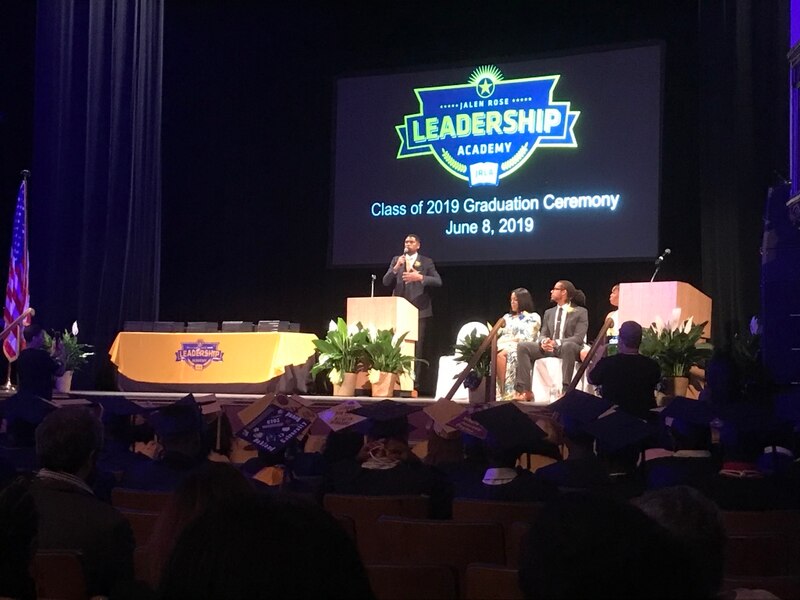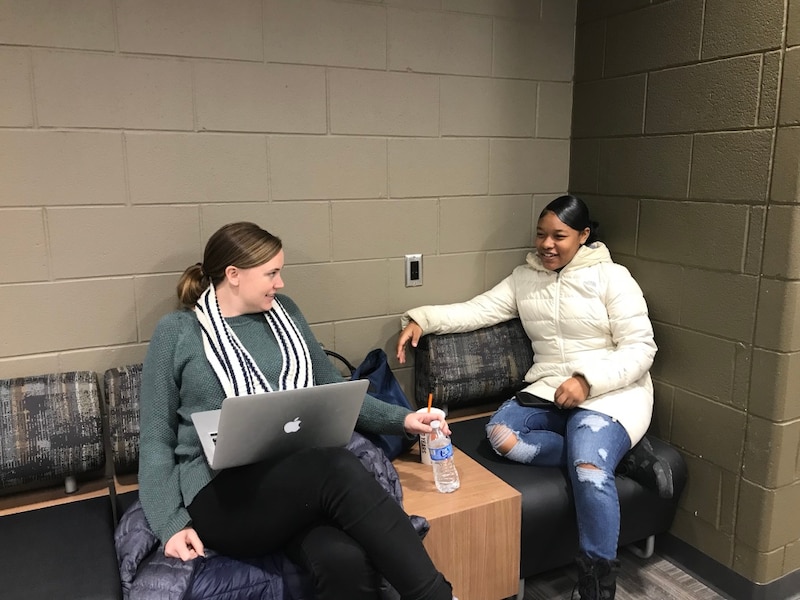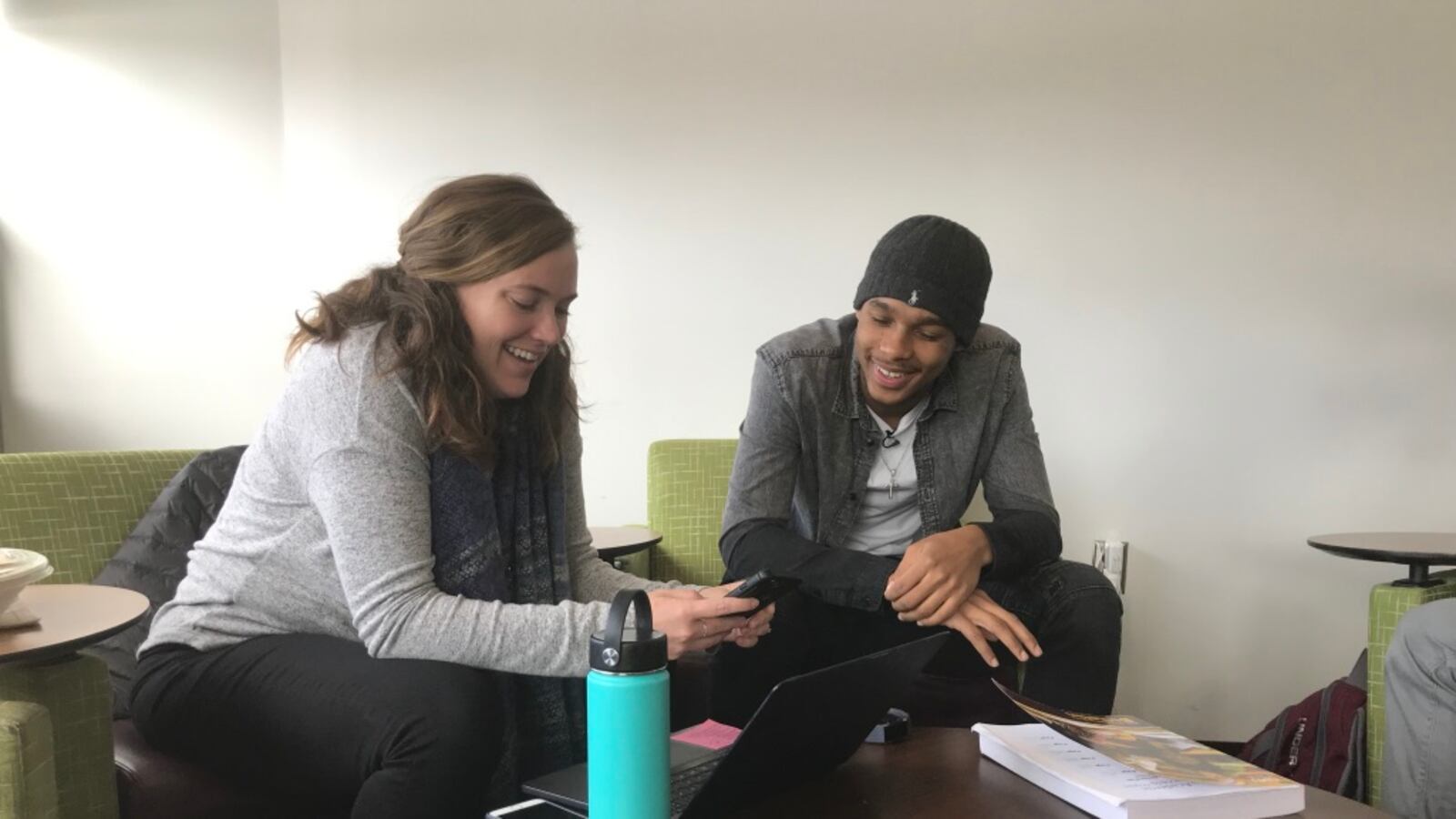If you graduate from the Jalen Rose Leadership Academy and go on to college, there is no escaping Katherine Grow. She’ll call, she’ll email, and she’ll show up on campus. And usually, during those campus visits, she’ll ask to see your phone.
The cell phones are a gateway to the college grades of the Detroit charter school’s graduates, and looking in is a key way that Grow monitors how those students are faring.
Grow is Jalen Rose’s alumni success coordinator, an unusual position that reckons head-on with a reality that many schools serving low-income students face: Too many students head off to college and never graduate. Some charter networks and private schools have launched initiatives to stay involved in students’ college lives and academic success, but it’s rare for standalone schools like Jalen Rose to employ someone just to work with graduates.
As the number of graduates has swelled to 450 since Jalen Rose opened in 2011, Grow’s challenge has gotten bigger, too. Every day, she calls, emails, or visits Jalen Rose alumni, inquiring about their grades, offering advice about personal challenges, and listening to their anxieties.
In the fall of 2019, Grow traveled more than 2,600 miles to visit Jalen Rose alumni at colleges and universities across Michigan.
Staff at the Jalen Rose school, which enrolls more than 400 students, pride themselves for creating a family atmosphere, and Grow often tears up as she greets the students on their college campuses, touched by how they’ve transformed into young adults pursuing their dream.
“That’s the piece that sustains me, that makes me get up, that makes me drive two hours to a campus,” Grow said. “We’re doing the work to create the change that needs to happen.”
A strategy to combat dismal statistics
For many Detroit teens, getting to college is just the beginning. An analysis done by the Detroit College Access Network found that of students who graduated from high school in 2015 and enrolled in college, 74% made it through a second year. But only 41% of them had accumulated 24 credit hours, which would put them on track for college graduation.
It isn’t just a Detroit problem. Nationally, just 60% of students overall who enroll at four-year institutions earn a bachelor’s degree within six years. The graduation rate is much lower for black students (40%) and low-income students (49%) — exactly the students that Jalen Rose serves — as well as for Hispanic students (55%).
This year, Chalkbeat is seeking to answer the question of how schools that educate students from low-income and disadvantaged communities can better prepare them for college, and what higher education institutions must do once they arrive to keep them on track.
The series, Ready or Not, follows several students through the challenging first year of college, when academic, financial, and social barriers can derail them.
Two of those students — Kashia Perkins and Demetrius Robinson — graduated from Jalen Rose and got visits from Grow in their first semester.
Perkins and Robinson were committing to college when they signed up to attend Jalen Rose, a school with an enrollment of just over 400 that’s oriented totally toward getting students not just to college but through it. Where many schools the same size might have a single college counselor, Jalen Rose has a four-person college team. Students talk about college starting in ninth grade, and at their graduation recite a pledge committing to another four years — at least — of schooling. And graduates know that not only will Grow be checking up on them, but they can rely on others at the school to provide guidance, or to just keep in touch.
That whole-school effort will be more important than ever. Grow, who’s also been a teacher, coach, and adviser over the course of seven years, is leaving the school for a job with a Detroit civic organization. It’s a bittersweet move for Grow and one that has school officials working to find a replacement while also making sure alumni get the help they need.
News of her exit, which came this week, “hit us hard,” said Melissa Hamann, the president and CEO of Promise Schools, the company that manages the school. Grow, known as Kat to everyone, will still be a resource for the students, given the strong relationships she’s already cultivated, Hamann said.
“She’s not going to walk away from them,” Hamann said.
Meanwhile, though, work the team does and the close-knit nature of the school will ensure alums can connect with someone who can help with any challenges, Hamann said. And a search is underway for a replacement. The goal is having someone new on board before the end of the school year, so they can begin to connect with the seniors who will soon be alums.
Back in November, Grow sat down with Robinson during a long day at Central Michigan University in Mt. Pleasant.
As she met with Jalen Rose graduates, she pointed out and asked questions about missing assignments and low test scores. She also asked direct questions about how the students are adjusting socially, offered guidance when roommate squabbles came up, and checked to make sure the students weren’t dealing with financial problems. If they are, or they have other problems they need help with, Grow works to connect them with the resources they need.
At the end of each meeting, she left each student with advice and an improvement plan.
Robinson walked away from his half-hour meeting feeling like he’d aced it. He had to explain away some missing assignments, telling Grow that he had problems getting notifications of the work due on his phone. He walked her through his decision to change his major from athletic training to kinesiology. And he showed her a four-year plan he’d developed with his campus adviser.
Grow saw Robinson’s promise — but also urged him to stay focused on his academic goals.
“It’s time to buckle down and get some things done so you can … finish strong,” she told him.
“Of course, Ms. Grow,” Robinson answered. “I always stay focused. I’ve been on top of my game.”
For Grow, the work is personal. She grew up far from Detroit, in a small city in central California. Like many of the students she works with at Jalen Rose, she grew up knowing she would be the first in her family to go to college. Yet there was no question in Grow’s mind that she would make it there: Her mother pushed her to achieve because, Grow said, “she always wanted better for us than she had for herself,” and she excelled academically.
Grow, who is white, also had advantages because her family is middle-class, even though her parents lack college degrees. The statistics are clear that students like her are more likely to complete college — an inequity, she said, that drives her work at Jalen Rose.
“I’ve had a lot of privilege and I want to make sure that everyone is afforded that same privilege,” Grow said.
A schoolwide focus on college

Grow isn’t the only person committed to the college success of students at Jalen Rose. From the principal, Wendie Lewis, down to support staff, everyone at the school plays a role.
During the school’s senior pinning ceremony and college decision day event, students and their parents are asked to pledge to finish college, reading all together:
“I commit to attending class every day, giving my absolute best effort on all assignments and tasks given, seeking help when I need it, ensuring that I renew my FAFSA each year, staying in constant contact with JRLA, taking advantage of my resources and opportunities in college, having fun and enjoying my time in college, graduating with a degree, certificate and/or a license.”
The words that Robinson, Perkins, and their classmates recited that day in May would become part of a contract they signed — an illustration of how seriously this school takes college success.
“We do push college,” David Williams, director of college graduation for Promise Schools, the company that manages the school, said during the ceremony. “We know what college can do. We know what the research says. The more education you have, the more money you make, the better prepared you are to take care of yourself and your family.”
The school is the namesake of co-founder Jalen Rose, the former member of the University of Michigan’s famed Fab Five basketball team, a former NBA player, and current TV sports analyst.
Rose, a graduate of the now-closed Southwestern High School in Detroit, believes strongly that the most important years of young people’s lives are the four years they’re in high school and the four years they could be in college. It’s during that time, he said, that they start to become young adults, which can often come with exposure to sex, drugs, violence, gang culture, and social media.
“There’s so many things that overwhelm the mind of young people. So if you can decompress and find a way to be successful in those eight years, then it puts you on the trajectory to achieve your goals,” said Rose, who was interviewed before the start of an annual golf tournament he hosts that raises money for student scholarships. “You ask any adult where their dreams went awry … and it probably happened in that eight-year window.”

Malika Velinor and Williams lead the college team that includes Grow. The team provides intense support to students to help them through the college application, preparation, and enrollment process. They connect students to mentors. They help them apply for scholarships. They teach them about the challenges they’ll face. And they teach them how they can overcome those challenges.
Grow, when she’s not connecting with alums, also works to build relationships — and strong partnerships — with colleges and universities. One such partnership with a program at Central Michigan, which provides support for first-generation students, allows Grow to receive regular updates on how the Jalen Rose alums who are part of that program are doing on campus.
Many schools – including every high school in the Detroit Public Schools Community District – have college advisors, who help students navigate the college enrollment process. Few, though, have someone like Grow, whose job is helping students be successful once they get to college.
Ashley Johnson, director of the Detroit College Access Network, an organization that coordinates efforts to ensure all students in the city have the opportunity to attend college, said that of the 51 high schools in and around Detroit that they work with, only two others have someone similar to Grow.
Johnson said the others include the Detroit Edison Public School Academy, one of the top-performing charter schools in the city, and Detroit Cristo Rey High School, a Catholic school.
For any school that strives to ensure that students get a college degree and are prepared for a career, “what we find is that getting kids into college isn’t enough,” Johnson said. “Right now, kids get into college and they don’t necessarily graduate.”
Connecting students to resources
When the school first opened, Rose talked often about the reality of opening a school in a city where many of the students entered high school far behind academically. That’s still an issue. Staff at the school work to catch students up, but there’s the realization that when they graduate and go to college, the students will have to work extra hard to stay on track.
The average SAT score for students last school year was 824, below the statewide average of 985. Few students at the school had scores that met the SAT’s standard for college readiness.

At the same time, the school’s most recent graduation rate was 92% for the Class of 2018. And about three quarters of the 87 students who graduated in the spring went on to some type of postsecondary education or the military.
Melissa Hamann, the president and CEO of Promise Schools, said that over the years, the college team has dedicated more of its resources to working with alumni. A key part of this effort has been surveying graduates who were unsuccessful in college “to unpack their high school and college journey to figure out what we and our college partners could be doing better.”
Academic preparation was an obvious issue, Hamann said. But so were issues such as time management and study skills.
“One of the things that has become apparent to us is colleges are admitting our students, but not all of them are really providing them supports for where they are academically once they’re on college campuses.”
So one thing Grow and her colleagues do is try to connect Jalen Rose students to resources at their colleges.
On a June morning, several dozen seniors from the Jalen Rose school hopped on a school bus and quietly rode the 11 miles to Henry Ford College, a community college in nearby Dearborn. This trip was the beginning of their college education.
The college team at the high school had arranged this visit to give the students an opportunity to do everything they needed before the fall semester began. They registered, took placement exams, signed up for classes with the help of advisors, and sat through an orientation. One student, a burgeoning musician, got a private tour of the school’s recording studios.
Part of what the college team does at Jalen Rose is connect students with people who can help their alumni succeed in college — people like Kalvin Harvell.
Harvell, a professor of sociology and coordinator of the Black Male and QUEENS Focus Group, a support network at the college, spoke to the visiting Jalen Rose students that day. He gave them frank advice about college, telling them at one point they need to treat their education as seriously as they do their “courting rituals.” He also told them to ignore naysayers who scoff at those who want to pursue an education, saying “we have to deconstruct these nonsense ideologies” about education.
Harvell, a Flint native who himself is a first-generation student, said that too often, the message some students get about education is negative. He had a different experience. In high school, he dreamed of becoming a “big-time rap star.” But his parents had different ideas. And they forced him to go to college.
“Some students don’t have that person that sees the potential in them … because with some of the parents, no one ever saw the potential in them.”
Colleges, he said, need to nurture students and provide the kind of services that will help them be successful. That’s why he’s taken such a strong interest in mentoring students at the community college.
“I can’t replicate my mom. She’s much smarter than me. But I want to replicate what she has done and push these young people in meaningful ways.”
On the road again
A week after Grow visited Central Michigan, she was on the road again — this time to Michigan State University, where she met with Perkins and other Jalen Rose alums.
Travel is a big part of Grow’s job. In October alone, she made visits to 11 colleges in the state. She’s on the road up to three days out of the work week, and will even travel outside of Michigan if necessary.
She and Perkins snagged a bench on the second floor of Bessey Hall for their meeting.

At one point during the conversation, Perkins talked about the pressure of being a first-generation student. She has a cousin in college in Kentucky, but she would be the first in her immediate family to receive a college degree — something she wants to do to set a positive example for her younger siblings.
“All the weight is on me,” she told Grow, noting that if her younger sisters see her succeeding in college, they’ll want to do it themselves.
Grow responded that Perkins should try to see her stress as helpful.
"They're not going to let you fall behind. ... And that's good."
Kashia Perkins
“Sometimes the pressure is good, sometimes the pressure is bad. Use it as a motivator,” Grow advised.
They wrapped with a discussion about keeping up with classes. As she did with Robinson the week before, Grow reminded Perkins that the second half of the semester is usually packed with more intense material. But Perkins — and a peek into her grades — hadn’t given her any reason to worry.
“As long as you continue to do the things you’re doing and stay on track, you’ll be fine,” Grow said.
The scrutiny that comes with her visits is something the students sign up for when they attend the Jalen Rose academy. Perkins, who is studying human biology, told Chalkbeat last summer that not keeping in touch with Grow “is not really an option.”
Members of the college team, Perkins said, “really push you.”
“They’re not going to let you fall behind. They try to give you as many opportunities as they can. And that’s good.”
Robinson said the check-ins are important because they show him “someone actually cares about what you’re doing in school,” besides his parents and other family members. And it’s not just Grow. One of his high school coaches checks up on him. So does his high school adviser.
“It helps all of us stay on track, not just for them but for ourselves as well,” Robinson said.
This year, as the number of alumni kept growing, Grow had to be more strategic about providing assistance, prioritizing students who are college freshmen and older students who are struggling.
The school has 450 alums, about half of whom are still in college. This spring, the first group of Jalen Rose grads began graduating from college. Grow said she keeps an open-door policy with those who’ve dropped out of college, too, always willing to help if they need it.
Grow hopes the students see her as not an employee of their former school but as a relative coming to see them, because the school prides itself on being a family.
The school’s graduation ceremony in June — the end of one chapter and the beginning of another — had all the markings of family gathering. Teachers who had advised the seniors throughout their time at Jalen Rose gave emotional, and at times, tearful speeches before introducing them and awarding their degrees.
“You, my baby girls, are bright and capable,” teacher Pam Mandigo told her all-girl advisory. “You are strong. And you are worthy. And you, my baby girls, are on a journey to greatness.”
And Rose, the former NBA star who knows the graduates are entering a make-or-break time in their lives, told them they won’t be alone on their journey through college.
“There are going to be some tough times, some tough days. Don’t hesitate to reach out to us. We’re a family.”
This project was produced with support from the Education Writers Association Reporting Fellowship program.
Editor’s note: This story has been updated to reflect new information about Kat Grow, the alumni success coordinator at the Jalen Rose Leadership Academy, announcing her departure this week.


